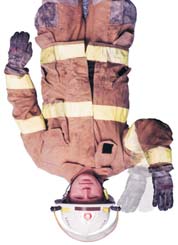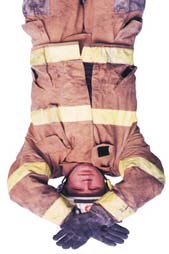Index
442
-- Page 443 --
444

 12/10/15 AIM
Section 5. Aircraft Rescue and
Fire Fighting Communications
6-5-1. Discrete Emergency Frequency 6-5-2. Radio Call Signs
a. Direct contact between an emergency aircraft Preferred radio call sign for the ARFF IC is
flight crew, Aircraft Rescue and Fire Fighting "(location/facility) Command" when communica-
Incident Commander (ARFF IC), and the Airport ting with the flight crew and the FAA ATCT.
Traffic Control Tower (ATCT), is possible on an EXAMPLE-
aeronautical radio frequency (Discrete Emergency LAX Command.
Frequency [DEF]), designated by Air Traffic Washington Command.
Control (ATC) from the operational frequencies
assigned to that facility. 6-5-3. ARFF Emergency Hand Signals
b. Emergency aircraft at airports without an In the event that electronic communications cannot
ATCT, (or when the ATCT is closed), may contact the be maintained between the ARFF IC and the flight
ARFF IC (if ARFF service is provided), on the crew, standard emergency hand signals as depicted in
Common Traffic Advisory Frequency (CTAF) FIG 6-5-1 through FIG 6-5-3 should be used. These
published for the airport or the civil emergency hand signals should be known and understood by all
frequency 121.5 MHz. cockpit and cabin aircrew, and all ARFF firefighters.
FIG 6-5-1
Recommend Evacuation
FIG 6-5-2
Recommend Stop
Aircraft Rescue and Fire Fighting Communications 6-5-1
12/10/15 AIM
Section 5. Aircraft Rescue and
Fire Fighting Communications
6-5-1. Discrete Emergency Frequency 6-5-2. Radio Call Signs
a. Direct contact between an emergency aircraft Preferred radio call sign for the ARFF IC is
flight crew, Aircraft Rescue and Fire Fighting "(location/facility) Command" when communica-
Incident Commander (ARFF IC), and the Airport ting with the flight crew and the FAA ATCT.
Traffic Control Tower (ATCT), is possible on an EXAMPLE-
aeronautical radio frequency (Discrete Emergency LAX Command.
Frequency [DEF]), designated by Air Traffic Washington Command.
Control (ATC) from the operational frequencies
assigned to that facility. 6-5-3. ARFF Emergency Hand Signals
b. Emergency aircraft at airports without an In the event that electronic communications cannot
ATCT, (or when the ATCT is closed), may contact the be maintained between the ARFF IC and the flight
ARFF IC (if ARFF service is provided), on the crew, standard emergency hand signals as depicted in
Common Traffic Advisory Frequency (CTAF) FIG 6-5-1 through FIG 6-5-3 should be used. These
published for the airport or the civil emergency hand signals should be known and understood by all
frequency 121.5 MHz. cockpit and cabin aircrew, and all ARFF firefighters.
FIG 6-5-1
Recommend Evacuation
FIG 6-5-2
Recommend Stop
Aircraft Rescue and Fire Fighting Communications 6-5-1

12/10/15 AIM Section 5. Aircraft Rescue and Fire Fighting Communications 6-5-1. Discrete Emergency Frequency 6-5-2. Radio Call Signs a. Direct contact between an emergency aircraft Preferred radio call sign for the ARFF IC is flight crew, Aircraft Rescue and Fire Fighting "(location/facility) Command" when communica- Incident Commander (ARFF IC), and the Airport ting with the flight crew and the FAA ATCT. Traffic Control Tower (ATCT), is possible on an EXAMPLE- aeronautical radio frequency (Discrete Emergency LAX Command. Frequency [DEF]), designated by Air Traffic Washington Command. Control (ATC) from the operational frequencies assigned to that facility. 6-5-3. ARFF Emergency Hand Signals b. Emergency aircraft at airports without an In the event that electronic communications cannot ATCT, (or when the ATCT is closed), may contact the be maintained between the ARFF IC and the flight ARFF IC (if ARFF service is provided), on the crew, standard emergency hand signals as depicted in Common Traffic Advisory Frequency (CTAF) FIG 6-5-1 through FIG 6-5-3 should be used. These published for the airport or the civil emergency hand signals should be known and understood by all frequency 121.5 MHz. cockpit and cabin aircrew, and all ARFF firefighters. FIG 6-5-1 Recommend Evacuation FIG 6-5-2 Recommend Stop Aircraft Rescue and Fire Fighting Communications 6-5-1